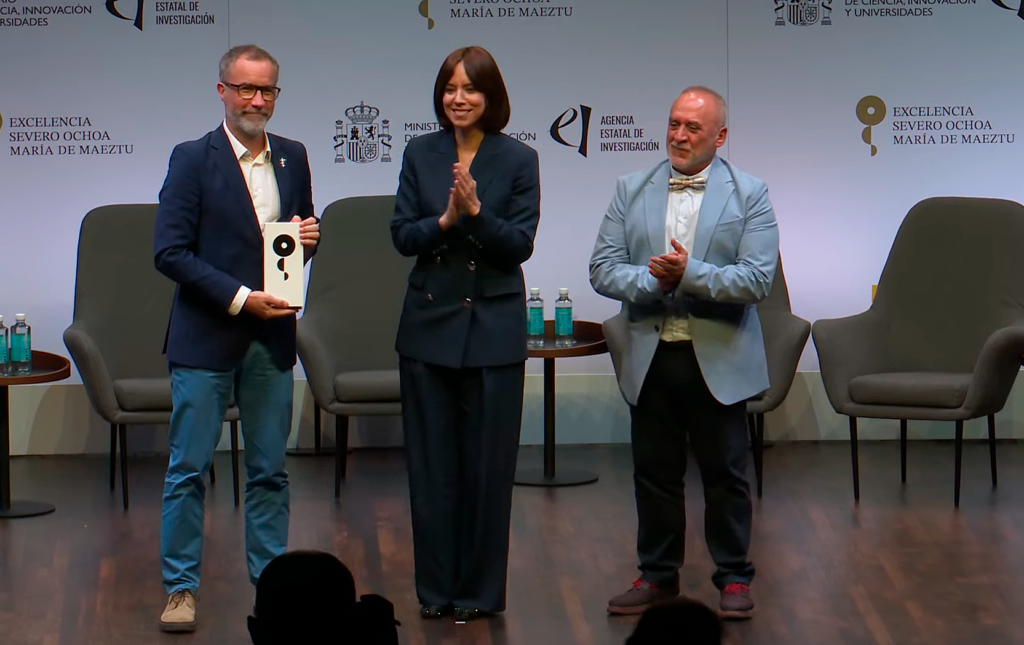The director of the Instituto Galego de Física de Altas Enerxías (IGFAE), Carlos Salgado, received this Thursday the María de Maeztu accreditation of excellence, awarded by the State Research Agency of the Spanish Government. The seal reaffirms the scientific work of this joint centre of the University of Santiago de Compostela and the Xunta de Galicia, created in 1999, which is so far the only Galician centre to achieve this distinction.
With this recognition, the result of a rigorous evaluation, the IGFAE consolidates its global projection in the field of particle, astroparticle and nuclear physics, both theoretical and experimental. Its staff has a long track record, assuming important responsibilities in some of the largest scientific facilities in the world, such as the European Organization for Nuclear Research (CERN), the Pierre Auger cosmic ray observatory, the LIGO gravitational wave detector, the GSI-FAIR or GANIL nuclear physics facilities, or the NEXT and DUNE neutrino experiments.
At a ceremony held at the CaixaForum in Madrid, Carlos Salgado received the accreditation from the Spanish Minister of Science, Innovation and Universities, Diana Morant, and the Secretary of State, Juan Cruz Cigudosa. Also present at the award ceremony were the IGFAE’s deputy director, Abraham Gallas, and the manager of the USC, Javier Ferreira.
The María de Maeztu seal, which represents funding of 2.6 million euros, will enable the IGFAE to develop its strategic plan for the coming years, with an emphasis on greater involvement in international experiments, training research staff, attracting talent and reducing the gender gap.
‘The first accreditation meant a profound transformation for the IGFAE: we practically doubled our staff, opened up new lines of research and laid the foundations for a structure that we now want to consolidate’, Carlos Salgado says.
2024, a year of milestones for the IGFAE
This distinction of excellence comes in a 2024 full of milestones for the future of the Institute. In May, the IGFAE also renewed its presence in the Galician Network of University Research Centres, which will mean funding of around 3M euros until 2027. This double regional and state recognition will allow the funding of numerous PhD contracts and will ensure the continuity of the centre’s strategic lines of research, with the acquisition of essential equipment and infrastructures to reaffirm the IGFAE’s international collaborations.
Construction works on the new headquarters, financed by the Xunta de Galicia, are expected to be completed in the last months of the year, with an investment of around 5M euros. At present, the Institute’s staff is already working in the new areas. Once the works have been completed, the centre will increase its previous surface area by 70%. With the new headquarters at full capacity, the IGFAE will have new and larger experimental laboratories, common spaces and areas open to society for outreach activities.
Within this framework, the IGFAE is commemorating its 25th anniversary with an wide programme of activities open to the public. The aim is to make the scientific work carried out by the centre more visible, encouraging reflection on the social and cultural impact of its research through exhibitions, concerts, outreach events and various initiatives aimed at the educational community. ‘We want to be a far more international centre, much more open, and we want society to see us from different points of view,’, Carlos Salgado emphasises.
About SOMM alliance
The alliance of Severo Ochoa centres and María de Maeztu units (SOMMa) is made up of just over 60 centres, in which cutting-edge science in all branches of knowledge is developed. The award of this seal of excellence is achieved after an independent evaluation by an international committee of great scientific prestige.
This recognition by the Spanish State Research Agency is valid for six years and is fundamental for the development of these centres. Membership of SOMMa offers the ideal conditions for attracting and training scientific talent and promoting cutting-edge research, under the principles of excellence, integrity, external evaluation, competitiveness and international collaboration.
